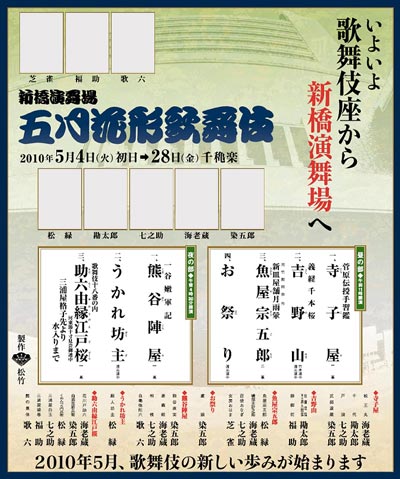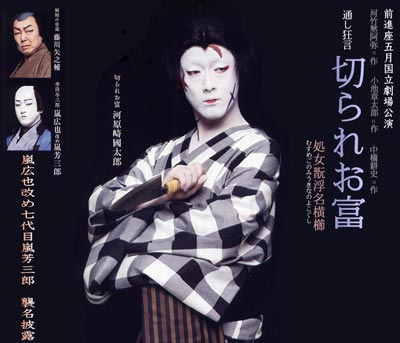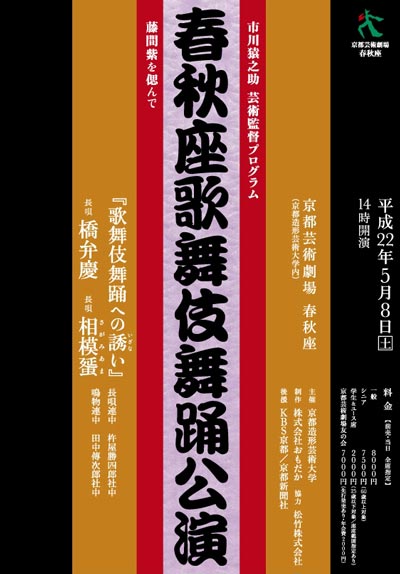| Comments |
As the Kabukiza was closed at the end of April 2010,
the traditional May dankikusai
will be held for the very first time in Kabuki history outside T˘ky˘ ...
in ďsaka at the Sh˘chikuza:
Gapp˘ Anshitsu: frequently performed in Kabuki, this play shows the
scandalous theme of a mother's passion for her son. Tamate Gozen (Onoe Kikunosuke) has become the
second wife of a great lord, but has fallen in love with one of her stepsons,
Takayasu Shuntokumaru (Nakamura Tokiz˘). He has fled the mansion and now, disfigured by a strange illness,
has taken refuge in the house of Tamate Gozen's parents. Tamate Gozen appears
declaring her love and, enraged, her father Gapp˘ (Band˘ Mitsugor˘) stabs her. On the point of death,
Tamate Gozen reveals that this was the only way that she could save the lives of
her stepsons.
Kanjinch˘: probably the most popular Kabuki play today,
it includes dance, comedy and the heart-warming pathos of a band of heroes
during their last days. Disguised as a band of traveling priests the
fugitive general Yoshitsune and his small band of retainers are stopped at a
road barrier. They escape only through the quick thinking of the head retainer,
a warrior priest named Musashib˘ Benkei, who improvises the text of an elaborate imperial
decree. Having escaped danger Benkei and the others describe their days of
glory and hardships on the road to escape in a moving dance.
This program stars Ichikawa Danjűr˘ in the role of Benkei,
with Living National Treasures Sakata T˘jűr˘ and Onoe Kikugor˘ as Yoshitsune and the barrier keeper Togashi.
K˘chiyama: the tea priest K˘chiyama (Band˘ Mitsugor˘) is a skilled thief and
extortionist, but cannot turn down a request to help those in need.
He disguises himself as a high-ranking priest to try to gain the freedom of a
girl held by a powerful samurai lord (Nakamura Kinnosuke) because she will not become his mistress.
Using the famous poetic cadences of the late 19th century playwright Mokuami,
K˘chiyama not only succeeds in his mission to rescue the girl, but he manages to
extort a fair amount for himself. Featuring also Ichikawa Danz˘ and Nakamura T˘z˘.
Jusshuk˘: Princess Yaegaki is mourning the death of his fiance Katsuyori,
but as she burns incense in his memory,
she notices the resemblance between the new gardener and her fiance's portrait.
The gardener is in fact Katsuyori, who has entered the household of Yaegaki's father to regain the
possession of a stolen family treasure, a famous helmet, with the help of Nureginu, a woman who also mourns for the man that died
in the place of the real Katsuyori. Unfortunately, Yaegaki's father has also seen through the disguise and plans to kill Katsuyori.
The role of Princess Yaegaki, one of the most important onnagata roles,
is played by Nakamura Tokiz˘, supported by Nakamura Kinnosuke, Onoe Kikunosuke and Ichikawa Danz˘ in the roles of Katsuyori, Nureginu and Nagao Kenshin.
Ky˘ Ningy˘: this dance tells the story of the woodcarver Hidari Jingor˘,
famous for the sleeping cat on the great gate of Nikk˘. He brings a statue of a
beautiful courtesan to life and then there is a spectacular fight scene with a
variety of carpenterĺs tools. Starring Band˘ Mitsugor˘ as Jingor˘ and Onoe Kikunosuke as the doll
of the courtesan.
Kamiyui Shinza: Shinza is a barber that goes from door to door, but at
the same time, he is a villain that kidnaps Okuma, the beautiful daughter of a
wealthy household, and even resists the efforts of Yatagor˘ Genshichi, the most
prestigious strongman in town, to get her release. Starring Onoe Kikugor˘ as Shinza,
Nakamura Baishi as Okuma, Nakamura Tokiz˘ as Chűshichi and Ichikawa Danjűr˘ as Yatagor˘ Genshichi.
Source: Earphone Guide website
|



